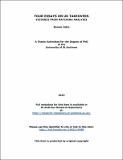Files in this item
Four essays on UK takeovers : evidence from matching analysis
Item metadata
| dc.contributor.advisor | Barbopoulos, Leonidas | |
| dc.contributor.author | Adra, Samer | |
| dc.coverage.spatial | 153 p. | en_US |
| dc.date.accessioned | 2016-09-13T09:41:53Z | |
| dc.date.available | 2016-09-13T09:41:53Z | |
| dc.date.issued | 2015 | |
| dc.identifier | uk.bl.ethos.694552 | |
| dc.identifier.uri | https://hdl.handle.net/10023/9488 | |
| dc.description.abstract | In four empirical chapters, matching analysis is employed to estimate the effects of specific contractual and regulatory arrangements on particular deal outcomes in the UK takeover market. The first chapter highlights the positive effect of earnout financing on the acquiring firms' returns in private target acquisitions. Furthermore, this chapter offers a detailed example of how the non-parametric Propensity Score Matching, despite its growing popularity in financial research, can lead to inaccurate inferences when relevant private-target-specific factors are omitted from the analysis. The second chapter provides the first empirical examination of the effect of the earnout's terms on the premium offered to the target firm's shareholders, and how information asymmetry concerns influence this premium. Additionally, the findings indicate that increases in the premia are negatively interpreted by the market in non-earnout financed deals. However, this negative effect is neutralised in comparable earnout financed deals. The third chapter provides the first empirical contribution that highlights the deal- and firm-related factors that contribute to the growing reliance on the Scheme of Arrangement, as a substitute for the Contractual Offer, in conducting UK public target deals. Despite the concerns raised in the legal literature about the limited bargaining power of the target shareholders under the Scheme, the robust conclusions indicate that such shareholders manage to receive premia that are at least as high as the premia received by shareholders in comparable Offer deals. The fourth chapter employs a hand-collected dataset that covers the incidences of termination fee use in the UK takeover market. The main result is that, in the period preceding the ban that The Panel on Takeovers and Mergers had imposed on termination fees, the inclusion of these fees had a beneficial, or at worst neutral, effect on target shareholders' wealth. Consequently, it is recommended that the Panel ends its ban. | en_US |
| dc.language.iso | en | en_US |
| dc.publisher | University of St Andrews | |
| dc.subject.lcc | HG4028.M4A3 | |
| dc.subject.lcsh | Consolidation and merger of corporations--Great Britain--Mathematical models | en_US |
| dc.subject.lcsh | Consolidation and merger of corporations--Great Britain--Finance | en_US |
| dc.subject.lcsh | Consolidation and merger of corporations--Great Britain--Law and legislation | en_US |
| dc.title | Four essays on UK takeovers : evidence from matching analysis | en_US |
| dc.type | Thesis | en_US |
| dc.type.qualificationlevel | Doctoral | en_US |
| dc.type.qualificationname | PhD Doctor of Philosophy | en_US |
| dc.publisher.institution | The University of St Andrews | en_US |
This item appears in the following Collection(s)
Items in the St Andrews Research Repository are protected by copyright, with all rights reserved, unless otherwise indicated.

